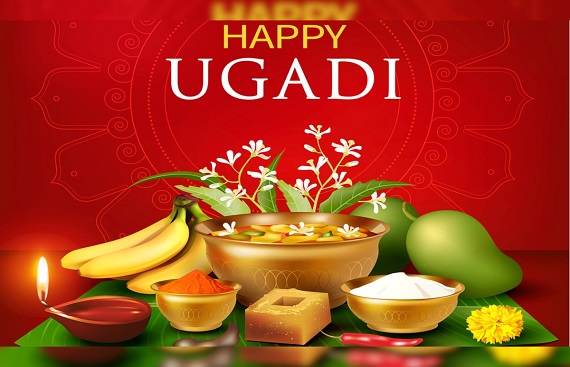From Bevu Bella to Panchanga: Wishing you a Joyful Ugadi 2022

Yugadi is the most ancient tradition performed by Hindus. The inscriptions show us the significant donations to Hindu temples and community centers that are made on this day. On the same day, it is also observed as a New Year in the states of Karnataka, Andhra Pradesh, and Telangana. In many other parts of India, especially in Maharashtra, Yugadi is celebrated as Gudi Padwa.
The name Yugadi or Ugadi is derived from the Sanskrit words yuga (age) and adi (beginning). According to the traditional calendars, Yugadi is the first day of the New Year in Floral decorations, traditional rituals, and delicious food symbols of the celebrations. Being an important festival in south India, it has a special place in the country's cultural heritage. There's a lot to know about the Yugadi festival, and in this article, we will learn more about Yugadi.
History:
![]()
History indicates that Lord Brahma made the universe on the day of Yugadi. Lord Brahma introduced days, weeks, months, and years to keep track of time. Therefore, it is believed that Yugadi marks the beginning or the first day of the universe. According to Hindu scriptures, Yugadikrit was one of the many names of Lord Vishnu, which means the creator of ages or Yuga. Therefore, Kannadigas and Telugu people worship Lord Vishnu and seek the Lord's blessings for happiness and prosperity in their lives.
Yugadi Celebrations:
![]()
Yugadi begins a week in advance and includes customs common to many spring festivals, such as house cleaning and buying new clothes. On the day of Yugadi, celebrations start with decorating houses with colorful rangoli designs; torans are made of mango leaves and traditional foods. A practice is to get up before dawn for an Abhyanga head bath and after massaging with sesame oil. Yugadi heralds the arrival of spring and warmer weather. It is a lively festival signifying growth and prosperity, and as with all New Year festivals, it is a chance to put the mistakes of the past behind, make predictions, and an excellent time to start new ventures.
Traditional food prepared during Yugadi is Bevu Bella, a paste made from jaggery, neem buds, tamarind juice, and raw mango. The paste combines several sweet and sour tastes. These different tastes are intended to remind anyone tasting the paste that life is a mixture of happy and sad events. Besides, the Bevu Bella stands for the six emotions of human life, which are believed to guide human life principles.
Yugadi is also a time of cultural activities. Devotional songs, hymns, and poetry recitals are arranged as a part of this festival. People gather together to listen to the Panchanga or the forecast of the New Year. This ritual is known as 'Panchanga Shravanam.' Yugadi is a time of family unions. People assemble to enjoy and feast on this day. According to ancient practices, seeking the blessings of the elders in the family is a must for a happy year ahead.
Yugadi's Lip-smacking Traditional Recipes:
![]()
Most of the dishes are seasonal foods, and the best way to understand the food is by looking at the varied climates. Each season offers particular local produce. The seasons are also bonded to the principles of Ayurveda, which provides advice about what foods should be consumed and when. There are also cooking and preservation methods depending on season and region.
The highlighted recipes of the festival signify that one must be ready to embrace all kinds of flavors or experiences in the coming year. The Lip-smacking traditional dishes are obbattu, Dal vada, kosambari, Palya, mavinakayi chitranna, shavige payasa, puliyogare, Udupi rasam, Pachadi, and curd are the dishes that are part of Yugadi.
Beauty of Harvesting on Yugadi:
![]()
India consists of 29 states, and every state celebrates harvest festivals at different times of the year. The first yield of the crop is happiness for the people, and they honour it cheerfully as a festival. Festivals have always been the most amazing rituals in all the countries and continents. Being India a colorful nation, India's most passionate harvest festivals involve interesting mythological stories and joyful celebrations. They are as incredible and diverse as their people and geographies and let you undergo the magnificence of the Indian culture—nevertheless, dates for harvest festivals in different parts of the country change due to diversity in climate.
One of the most prevalent practices connected with Yugadi in Karnataka is looking at the young moon in the evening hours. People gather and wait for the young moon to come up and watch it, assuming that the sides of the moon are interconnected to the season's harvest. The moon's direction determines whether the harvest will be good or not.
If the upper end of the moon is visible, they believe that the harvest will be good, whereas when the lower end of the moon is visible, they consider that the harvest will be average.
Conclusion
After two years of the pandemic, people have geared up their celebration just like the old days. The festival of Yugadi is also considered a lucky day to start a new business venture, to purchase a new vehicle or house. The message of the Yugadi festival is to raise above all happiness, sorrow, failure, and success in life and accept it as one’s own good.
